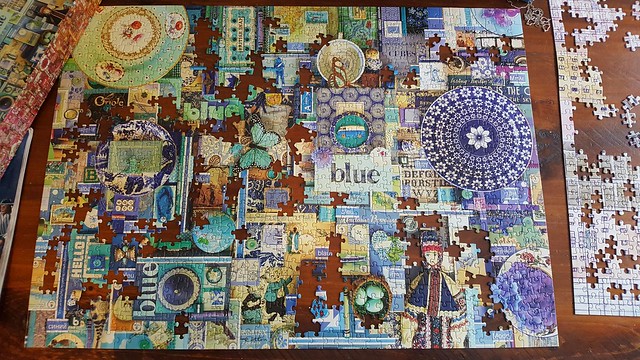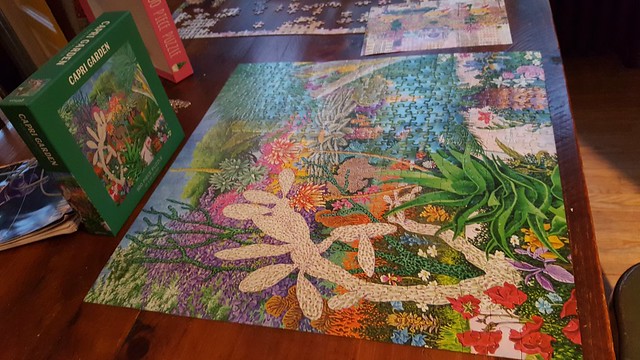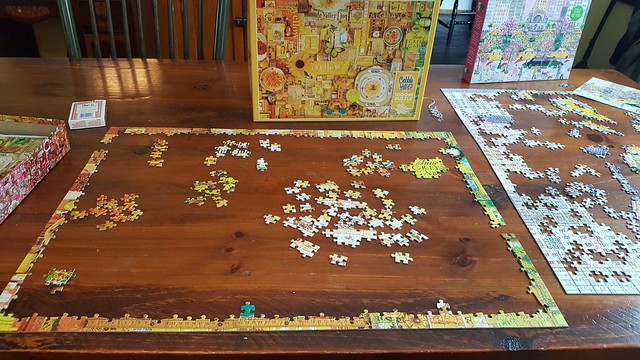This will be a rather obvious window into the thrilling state of my evenings, but I am getting through February on puzzles and podcasts. Puzzles, podcasts, and pots of herbal tea.
Last night’s Puzzle ‘n Podcast podcast was on how often we misinterpret how others perceive us: apparently, a lot. It’s a show called The Hidden Brain, and the episode is “Mind Reading 2.0: How Others See You.” Listening to this I was thinking about friendship, and wondering what prevents us (sometimes? often?) from saying what we really mean. Politeness? Fear of rejection? False assumptions about what may happen? Or maybe assumptions based past experience? Maybe we don’t always know what we really mean. Or maybe we get mixed up due to the social setting, confused by the extra information we’re taking in (and quite possibly misinterpreting!). Anyway, it’s fascinating.
I keep puzzling over why it’s not common practice to set out boundaries or expectations or even state hopes for our friendships (it really isn’t, though). Why are friendships more tenuous, undefined things, when other relationships carry expectations, stated and otherwise? Maybe in friendship there’s both more at stake and less. Friendship enriches life. But we don’t usually buy a house with a friend, or share a pet with a friend, or move to another city if our friend moves to another city. We might go months without seeing a friend and then fall back into closeness in an instant. We know in advance that we may lose friends in a way that’s more baked in than in other relationships. We probably also expect to have many friends in different contexts over a lifetime. I’m riffing here.
and yet, and yet, and yet … I acknowledge that big emotions get stirred up in friendships, fears get tapped, there can be jealousy, envy, comparison, grasping, insecurity … and love, caring, commitment, thoughtfulness, kindness, spontaneity, fun … friendship is a spacious concept, elastic, flexible … that’s a good thing, but it also means there’s more uncertainty … maybe friendship is an almost liminal space where we have the opportunity to become comfortable with not-knowing, not-clinging, letting go?
I’m riffing.
A friendship is a relationship that can change as we change; and/or it can offer the familiarity of someone who knew us when. There’s insecurity in the uncertainty of what being a friend means and demands of us. I feel it as I try to write about my experience(s) of friendship.
For myself, I think friendship is always and forever an opportunity to learn, to be challenged, to get to know myself more honestly (weaknesses, strengths, boundaries, sense of humour). If I’m feeling down or low the cure ALWAYS is to reach out to a friend. ALWAYS. Paradoxically, this is also the moment it’s hardest to reach out. (This is what texting is for!)
The other thing on my mind (unrelated to friendship) is how people seem really angry right now. People are struggling with their emotions, looking for easy targets of blame. Positions are getting entrenched (which always seems dangerous to me). The pandemic years have been a good reminder that I can’t assume I know what anyone else is thinking or feeling. Maybe in friendships we dance around this, maybe it’s one of friendship’s most important gifts — maybe within the uncertain structure of a friendship there’s an implicit understanding that we aren’t always on the same page, and we’re trying to listen and be curious about our differences, we’re paying attention to another’s experiences.
In friendship, there’s so much room for exchange. Generous exchange. Friendship is a practice in curiosity, attention, lightness, vulnerability, caring, holding and letting go.
xo, Carrie
P.S. Please send podcast recommendations. I’m addicted to the puzzling (the puzzles shown above are just from the past week!!!! True confession). And winter continues.
P.S. 2 I’m adding this note in post-publication, with thanks to Julia who tipped me to a fabulous (and recent) article in The Atlantic about friendship, in which appears this memorable (and useful) analysis of what holds friendship together:
Practically everyone who studies friendship says this in some form or another: What makes friendship so fragile is also exactly what makes it so special. You have to continually opt in. That you choose it is what gives it its value.





The two podcasts I have seen you mention so far — Hidden Brain and New York Fiction — are my tops.
Others I love: Where should we begin with Esther Perell; This American Life with Ira Glass; The Happiness Lab with Dr. Laurie Santos… And The New York Times Modern Love podcast and Dear Sugars with Cheryl Strayed.
Have you ever thought about doing one yourself?
P.S. If you are addicted to puzzling, consider trying also Lego Expert…
Thank you for these suggestions, Amy!
re podcasting myself … I think the best “talk” podcasts usually involve a conversation with someone else, and really good chemistry between the people involved. and a subject that audiences are interested in. it’s good food for thought. interviewing is such an art.